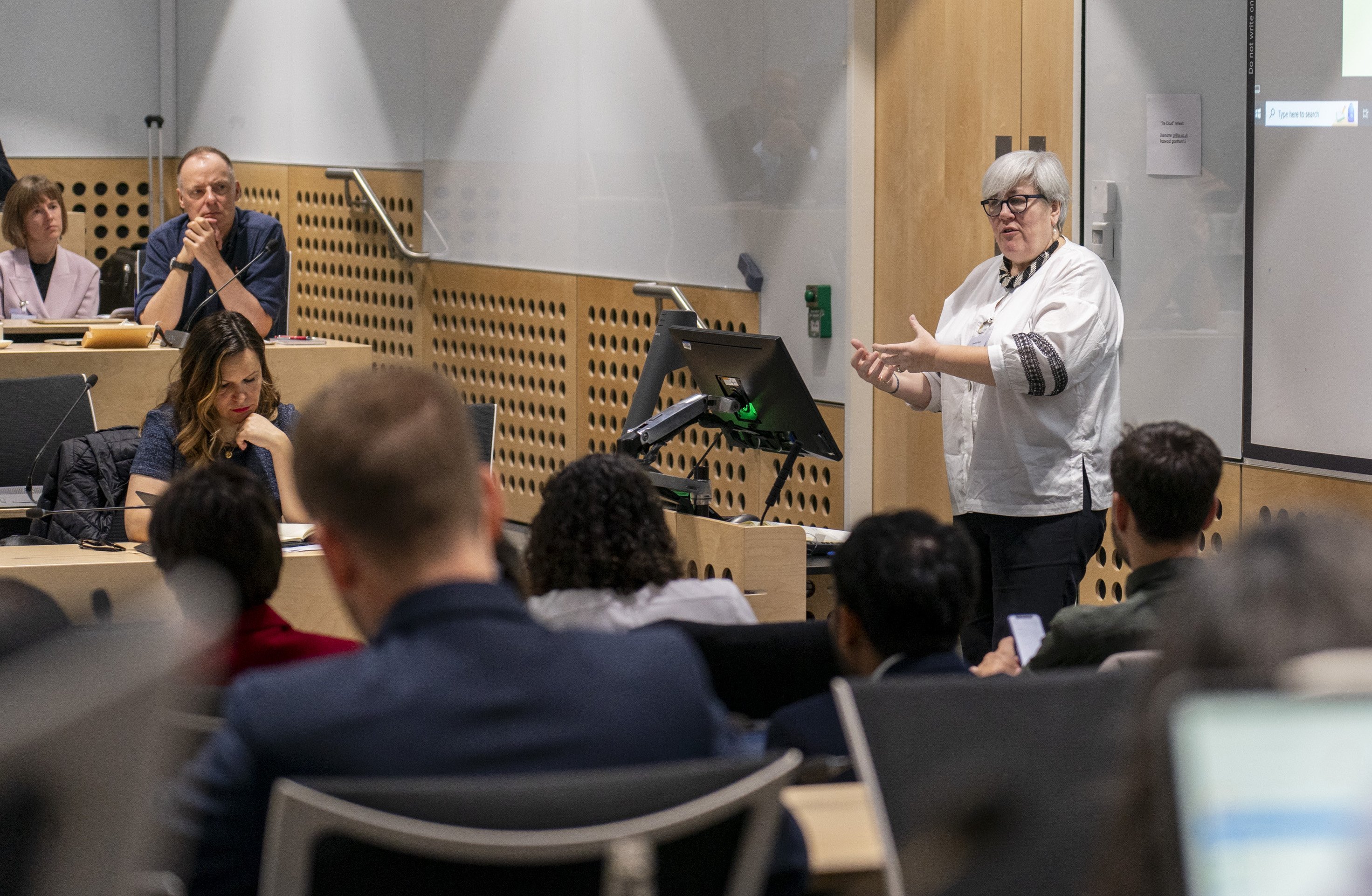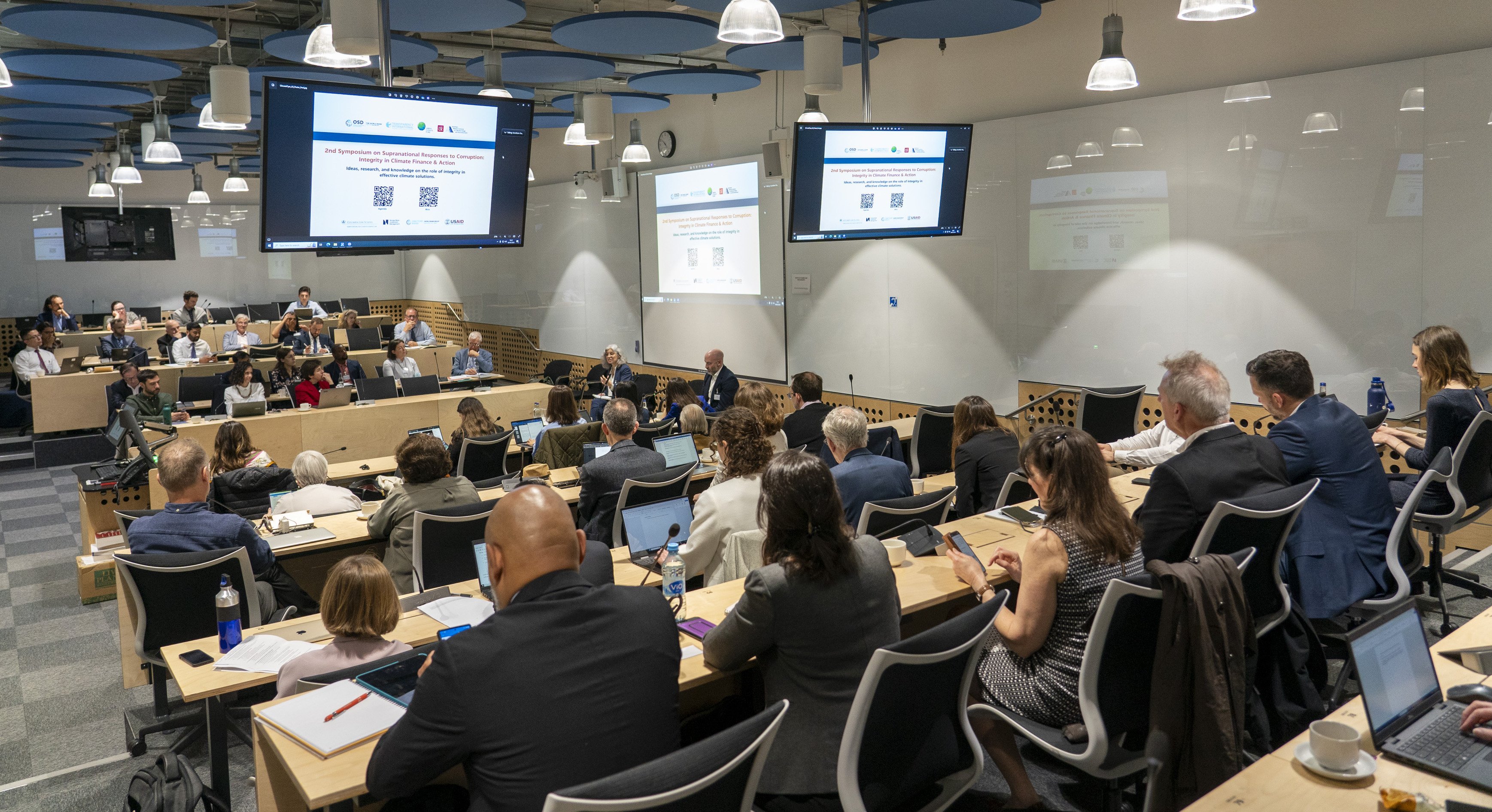Carving pathways from transparency in beneficial ownership to climate integrity

Keynote speaker Rachel Kyte, Dean Emerita, The Fletcher School, Tufts University; Professor of Practice in Climate Policy, Blavatnik School of Government, University of Oxford; former World Bank Group Vice President and Special Envoy for Climate Change. Photo: Noah Da Costa
An Open Ownership long read
Transparency in beneficial ownership (BO) came to the fore as a foundational anti-corruption reform at the second Symposium on Supranational Responses to Corruption: Integrity in Climate Finance and Action, hosted in May 2024 at the London School of Economics. The widespread implementation of BO registers has the potential to cut across risks in mitigation and adaptation activities, from the governance of minerals critical to the energy transition, to countering corruption in climate finance. Yet in the same week, news broke that hundreds of scientists view the prospects of limiting the rise of global temperatures to less than 1.5°C above pre-industrial levels with diminishing hope. This raises open questions about whether this promising policy intervention can effectively support timely climate action.
Is the link between anti-money laundering and climate issues strong enough for transparency in beneficial ownership to be leveraged for integrity?
Connections are increasingly being made between the effective implementation of BO registers for the purposes of anti-money laundering (AML) and climate issues. In March 2022, the Financial Action Task Force (FATF) made central registers a core recommendation, which has further spurred their implementation for the purposes of AML worldwide. A recent blog post from the Joffe Trust summarised the link as follows: “The machinery of fighting illicit finance and economic crime can be cranked up to fight ‘green corruption’ and environmental crime: plugging the money that leaks out of the system, safeguarding transformative investments, restricting bad actors and hugely boosting the climate cause”.
Environmental crime is one key point of intersection. For example, a recent report from the United States-based Financial Accountability and Corporate Transparency Coalition found that the use of anonymously owned corporate vehicles, along with real estate, masks the true beneficiaries behind environmental crime in the Amazon, including illegal mining and forestry crimes. Both drive large-scale deforestation that poses a major climate risk for the world.
Despite its consideration within the global AML agenda under the FATF, environmental crime is still viewed as being “low risk, high reward”, and there is a need to strengthen the link between combating AML and climate issues. One key measure is to add environmental crimes to the list of predicate offences for money laundering in both source countries, from which illicit funds originate, and destination countries, to which laundered funds are transferred. Moreover, cooperation and the exchange of information between law enforcement agencies, including on beneficial ownership, is critical.
Are beneficial ownership registers up to the task of supporting climate integrity?
Climate finance and action raise a litany of complex issues, and this complexity finds its way into the practical means of applying beneficial ownership transparency (BOT) to ensure integrity. As discussed below, using BO data for climate accountability is often about tackling standard corruption issues, such as conflicts of interest in licensing and contracting processes for transition minerals. However, it may also demand implementing jurisdictions and data users to tackle some of the more complex issues that sit at the forefront of effective implementation.
For example, listed companies, state-owned enterprises, and investment funds are major actors in the climate space. Research using the Carbon Majors database has shown that just 57 predominantly listed- and state-owned companies have been linked to 80% of greenhouse gas emissions since 2016. Meanwhile, the massive influx of investment needed for the energy transition – most recently estimated by the International Energy Administration at over USD 4.5 trillion annually – is likely to be channelled through investment funds of all shapes and sizes. Yet these forms of corporate vehicles are some of the most likely to be either intentionally or inadvertently exempted from reporting requirements to BO registers, limiting the potential to use the information for their accountability.
Moreover, effective supranational responses require ease of coordination, including in the sharing of BO information. The current data landscape among jurisdictions implementing BO registers can be characterised as heterogeneous, which creates friction in effectively combining and sharing information. Structuring data in a way that allows for the connection of BO information across registers and with other relevant datasets is key; such as making it interoperable with contracting information so that it can be used to take action for accountability in public procurement. The Global Energy Monitor’s Global Energy Ownership Tracker demonstrates the challenges of collecting structured data to increase visibility over the ownership of energy systems, but structured data is needed in order to translate this to transparency not just at the level of companies in a legal ownership network, but also of their ultimate beneficial owners.
Finally, there may be a need to moderate expectations about the usefulness of BO information to solve some of the more fraught issues in climate finance and action. For example, carbon markets – worth over USD 2 billion as of 2023 – are a controversial solution to addressing climate change. Whilst they are widely viewed as a valuable tool, market entrants may lack experience, and allegations of mismanagement such as land grabbing, deforestation, and human rights abuses are numerous. They also suffer from a lack of transparency in how credits are acquired and used by companies for carbon offsetting, as well as in the deals being negotiated between governments and the companies creating credits.
Implementing BO registers at the domestic level may help to tackle some of these issues, namely by increasing transparency over who is controlling and benefiting from corporate actors involved in creating carbon markets. However, it will not be enough to address the lack of transparency in the ownership and use of carbon credits; nor will it address the huge challenge of oversight on the ground. Another significant but less understood issue is the distribution of transition risk associated with the financial ownership of stranded fossil-fuel assets, many held via investment funds. The rapid collapse of fossil-fuel industries could translate into an estimated USD 1 trillion in financial losses, which are expected to be overwhelmingly accrued in Organisation for Economic Co-operation and Development countries.
It is important to separate the beneficial ownership of corporate vehicles, such as companies, from that of assets, such as carbon credits. The BOT of assets is a separate issue that will be discussed in a forthcoming Open Ownership blog post. This is also a challenge in the effective governance of fisheries, where malign actors can obscure ownership over both vessels and licences (the assets), and the companies that own and control them. Since BO registers focus on corporate vehicles, they can only reveal part of the picture.
How can the use of beneficial ownership information best support climate action?

The symposium drew speakers and participants from multiple regions and diverse disciplines, including the private sector, civil society, media, and academia. Photo: Noah Da Costa
In order to produce any of the anticipated positive impacts, effective implementation of BO registers must translate into action. Even where BO registers are being well populated with high-quality information, potential users may overlook the opportunity, or may not know where to start. Whilst encouraging the acceleration of their implementation, anti-corruption and integrity actors can also think strategically about which actors should be encouraged and supported to use the information from BO registers for accountability in the climate space. They can help guide key users to start answering the questions they should be asking to assure greater climate integrity.
Some actors have a clear role to play. For example, agencies with responsibilities for licensing and contracting form an important part of the bulwark between climate finance and the way it is deployed to advance the energy transition. This includes licensing for critical minerals as well as for renewables infrastructure, such as wind and solar. A forthcoming briefing from Open Ownership and the Extractive Industries Transparency Initiative will show why and how these agencies can use BO information to support integrity in licensing processes, and discuss the use of data along the rest of the extractives value chain. Examples of major risks that can be detected at the licensing stage include ownership concentration, conflicts of interest, and the deliberate avoidance of applicant criteria, such as nationality requirements.
Another part of the solution may be found in less obvious places, such as within tax agencies. Domestic resource mobilisation will be an important avenue for financing climate mitigation and adaptation. The use of BO data by tax agencies can support this by helping curb tax avoidance and evasion using corporate structures.
Beyond these, there will be many other opportunities to deploy BO data both within and outside of government. However, encouraging the use of BO information by governments is also a strategic priority from the perspective of the sustainability and quality of BOT reforms: once tax agencies and other key government users consider information from BO registers a matter of business as usual, it will elevate their implementation as a priority in the public interest. At the same time, countless examples of investigations and reports from civil society and journalists have demonstrated that ensuring access for users outside of government is also vital to achieving holistic accountability.
There is a need from the early stages of implementation for feedback loops to be created between data users and implementers to make sure their needs are taken into account in the course of reforms. Where climate action is a policy priority, these can be further designed and implemented in a way that serves the needs of users with a role to play in the climate space.
Related articles and publications
Publication type
Emerging thinking
Blog post
Sections
Implementation
